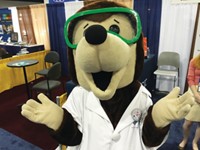Advertisement
Grab your lab coat. Let's get started
Welcome!
Welcome!
Create an account below to get 6 C&EN articles per month, receive newsletters and more - all free.
It seems this is your first time logging in online. Please enter the following information to continue.
As an ACS member you automatically get access to this site. All we need is few more details to create your reading experience.
Not you? Sign in with a different account.
Not you? Sign in with a different account.
ERROR 1
ERROR 1
ERROR 2
ERROR 2
ERROR 2
ERROR 2
ERROR 2
Password and Confirm password must match.
If you have an ACS member number, please enter it here so we can link this account to your membership. (optional)
ERROR 2
ACS values your privacy. By submitting your information, you are gaining access to C&EN and subscribing to our weekly newsletter. We use the information you provide to make your reading experience better, and we will never sell your data to third party members.
ACS Meeting News
Chemistry galore at the ACS Spring 2021 meeting
by Bibiana Campos-Seijo
April 9, 2021
| A version of this story appeared in
Volume 99, Issue 13
The American Chemical Society Spring 2021 meeting is in full swing. It’s chemistry galore over the next few weeks, and my colleagues and I feel like kids in a candy store. As is now traditional, C&EN will be covering the meeting and bringing you the latest, which you can find flagged as ACS Meeting News on cen.acs.org, in this and forthcoming issues of C&EN, and via C&EN’s weekly newsletter.
Once again, because of the ongoing pandemic, the meeting is being held virtually. Live presentations are April 5–16, and attendees can view sessions on demand from April 19 until the end of the month. If you haven’t registered, you can still do so at bit.ly/3d1jReO
Before the meeting, the ACS Council approved a new membership model, which will go into effect in 2022. This new model features new categories of members, including community associates, who pay no dues, and contributing members, who pay half the full dues. Members in the new categories will have limited access to benefits, while regular members will continue to enjoy full privileges, including access to C&EN. Also note that the cost of regular membership will decrease to $160 per year, from $175 in 2021.
C&EN fully supports this new membership model and continues to work with colleagues in the Membership Division to ensure we have offerings that are appropriate and relevant for each category. For years, members have consistently rated C&EN as one of the top benefits of ACS membership, and we are committed to engaging with every member in a meaningful way. The new model is an opportunity for ACS to establish relationships with a wider and more diverse spectrum of chemical scientists, further advancing ACS’s diversity efforts and ultimately the chemical sciences as a whole.
A highlight of ACS Spring 2021 was the Priestley Medal address, which took place April 9. JoAnne Stubbe was the 2020 recipient of the medal, but because the ACS Spring 2020 meeting was canceled, she was not able to deliver her keynote presentation—“The Road Less Traveled: For Love of Detection, Discovery, and All Things Radical in Nature”—until now. You can view the session on demand on the ACS National Awards page at bit.ly/39XUOHU or read it on our website.
The 2021 recipient of the Priestley Medal—A. Paul Alivisatos—is scheduled to deliver his address during ACS Fall 2021. You don’t need to wait, though—you can read it on page 30. C&EN senior correspondent Mitch Jacoby also wrote a profile of this “nanocrystal wizard” that you won’t want to miss. I was touched by the death of Alivisatos’s mother when he was just a boy and the extraordinary resilience he demonstrated after then being moved to Greece, where he could not speak the language.
In terms of science news from the ongoing meeting, I recommend Bethany Halford’s story on Pfizer’s much-anticipated new COVID-19 oral antiviral candidate (see page 7), a story that came from a timely symposium organized by the Division of Medicinal Chemistry dedicated to COVID-19 therapeutic approaches.
Among other coverage of the meeting, Sam Lemonick tells us about the chemistry of comet 67P (see page 7), and Katherine Bourzac writes about the presence of new and phased-out per- and polyfluoroalkyl substances in rainwater (see page 6).
Check the cen.acs.org homepage this week for the latest in C–H functionalization of polymers and identifying the signatures of chlorine gas use in vegetation and, of course, the very popular first-disclosures session, where never-before-seen structures of new drug candidates are presented and publicly discussed for the first time.
We’ve got you covered.
Views expressed on this page are those of the author and not necessarily those of ACS.



Join the conversation
Contact the reporter
Submit a Letter to the Editor for publication
Engage with us on Twitter